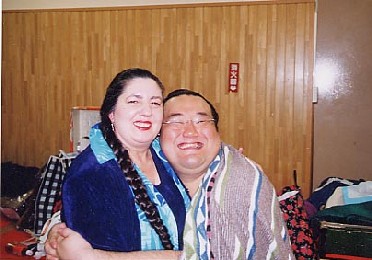
![]()
Amateur Sumo – the sport as it should be
Mark Buckton
Sakai World Sumo Champs – not all about winning
Las Vegas Koen
Joe Kuroda
Our man reports from the fight capital of the world
Rikishi of Old
Joe Kuroda
A look at a rikishi of yesterday with Kotozakura – our man for October
Heya Peek
John Gunning
John’s early morning dash to Azumazeki-beya & report on TKOTU
SFM Interview
Katrina Watts sits down with SFM’s Mark Buckton to discuss amateur sumo
Photo Bonanza
SFM’s best yet – Aki Basho/ Las Vegas / Amateur World Champs / Azumazeki-beya visit – seen nowhere else
Aki Basho Review
Lon Howard
Lon gives us his Aki Basho summary, along with the henka sightings results, and his take on the tournament while ‘gem’ of the basho takes a break
Lower Division Rikishi
Mikko Mattila
Mikko Mattila returns to cover lower division ups and downs
Kyushu Basho Forecast
Pierre Wohlleben & Mark Buckton
Pierre predicts the Kyushu Basho banzuke while Mark previews the ones to watch next time out
Sumo 101
Barbara Ann Klein
Discovers and explains amasumo & ozumo variations
Kimarite Focus
Mikko Mattila
Mikko once again walks us through his chosen kimarite
Minusha
John McTague
John’s unique bimonthly view of news from outside the dohyo
Online Gaming
Zenjimoto of ‘game fame’ covers some of the very best sumo games around – his own!
Kokugi Connections
Todd Lambert
Todd’s focus on 3 of the most interesting online sumo sites today
Fan Debate
Is the limit on foreign rikishi fair? See what our debaters had to say
SFM Cartoons
Benny Loh
In the first of our cartoon bonanzas, sit back and chuckle at Benny Loh’s offerings
Let’s Hear From You
What was it that made you a sumo fan? Gernobono tells all
Readers’ Letters
See what SFM readers had to say since our last issue
Sumo Quiz
The Quizmaster
Answer the Qs and win yourself next basho’s banzuke.

Katrina’s favorite – Takanonami smiles while she’s sitting on his lap!
MB – With over 80 nations now having registered sumo associations, do you see this figure expanding or has the sport reached saturation point overseas?
KW – Far from reaching a saturation point, I think it will continue to expand. Sumo’s inclusion in the World Games, and hopefully, the Olympics in the not-too-distant future, would encourage more and more people to want to try it.
MB – Do you really see sumo as being a serious contender for consideration at future Olympics?
KW – ABSOLUTELY! It had already been decided that If Osaka had got the 2008 Olympics, sumo would have been in as an exhibition sport. It’s really only a matter of time.
Next Home
Katrina Watts – Well, I wasn’t interested in sumo when I came to Japan. I knew it was the national sport because I’d seen it in documentaries and books about Japan, but, I had no particular desire to watch it. Then, every night, I had to sit through the “sports” before the world news on the TV, and, sometimes sumo was on, along with baseball and golf, and I gradually became interested. After seeing it live, I really got hooked. As for amateur sumo, I went out of curiosity and found that it was just as exciting as the professional.
MB – How do you see both of these sides of the sport
KW – Amateur sumo is still one of the main breeding grounds for professional sumo and people who’ve tried sumo at school remain interested in it as fans. Of course, many college and high school sumo champions turn pro these days, so amateur sumo is important to the professional world. On the other hand, exciting professional sumo encourages people to want to do amateur sumo. As far as foreigners are concerned, many of them got interested in doing sumo through watching the pro sumo on TV on NHK or Eurosport or ESPN.
MB – What role do you see the World Championships this month playing in the promotion of sumo worldwide?